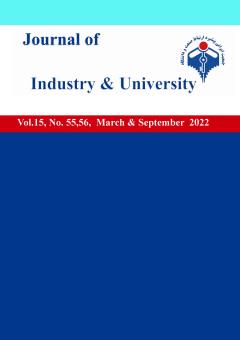Etiology of Robot Crimes: With Emphasis on Rational Choice Theory
Subject Areas : تخصصیmahboub afrasiab 1 , kamran shirzad 2
1 - Doctor of Law, Head of Vali Asr Judicial Complex (AJ) Tehran, University Lecturer, Iran
2 - Doctorate in criminal law and criminology, Adalat University, Tehran, Iran
Keywords: Robots, Artificial Intelligence, Rrational Choice, Decision Making,
Abstract :
Nowadays, artificial intelligence has become increasingly important as a technological advancement. Different applications of artificial intelligence in different realms, while being the source of services for humans, but the emergence of robotic crimes has posed challenges for humans. Therefore, the main issue in this area is the intervention of robots in criminal behavior. Regarding the crimes of the first generation of robots / non-intelligent robots, it should be said that robots have no role in committing a crime and are only a tool in the hands of the programmer. However, the generation of intelligent robots are active and rational social actors who move beyond the will of the programmer and seek to make moral decisions. The study, which seeks to analyze the crimes of robots in the light of rational choice theory, concludes that intelligent robots are among the white-collar criminals among criminals who pay the most attention to cost-benefit analyzes. In addition, the first generation of robots lack the ability to measure the benefits and costs of crime
1. آقابخشی، علی و دیگران، فرهنگ علوم سیاسی، تهران، نشر چاپار، چاپ اول، 1383
2. آلتمن، اندرو، درآمدی بر فلسفۀ حقوق، ترجمهی بهروز جندقی، قم، مؤسسه آموزشی و پژوهشی امام خمینی، چاپ اول، 1385
3. باقر قدیری اصلی، سیر اندیشه اقتصادی، تهران، انتشارات دانشگاه تهران، 1376
4. بنسون، مایکل. اس و سیمپسون، سالی، جرایم یقهسفیدی: رویکردی فرصتمدار، ترجمه اسماعیل رحیمینژاد، تهران، نشر میزان، چاپ اول، 1391، ص 106
5. بونی. اس. فیشر و استیون. پی. لب، دانشنامه بزهدیدهشناسی و پیشگیری از جرم، جلد دوم، ترجمه اساتید حقوق کیفری و جرمشناسی، زیر نظر علی حسین نجفی ابرندآبادی، تهران، نشر میزان، 1393
6. پاکنهاد، امیر، سیاست جنایی ریسکمدار، تهران، نشر میزان، چاپ اول، 1394
7. پرادل، ژان، تاریخ اندیشههای کیفری، ترجمه علی حسین نجفی ابرندآبادی، تهران، انتشارات سمت، چاپ دهم، 1394
8. دوئرتی، جیمز و فالتز گراف، نظریهای متعارض در روابط بینالملل، ترجمه علیرضا طیب و وحید بزرگی، چاپ پنجم، تهران: قومس، 1388
9. راین، آلن، فلسفۀ علوم اجتماعی، ترجمه عبدالکریم سروش، مؤسسه فرهنگی صراط، تهران، چاپ چهارم، 1387
10. رحیمینژاد، اسماعیل، نگاهی بر محدودیتها و نواقص قانونی کنترل جرایم اقتصادی در ایران، در دایرةالمعارف علوم جنایی، زیر نظر علی حسین نجفی ابرندآبادی، تهران، میزان، کتاب دوم، چاپ دوم، بهار 1395
11. ریترز، جورج، نظریهی جامعهشناسی در دوران معاصر، ترجمه محسن ثلاثی، تهران، انتشارات علمی، چاپ پانزدهم، 1389
12. شاول، استیون، مبانی تحلیل اقتصادی حقوق، ترجمه محسن اسماعیلی، تهران، معاونت پژوهشی مرکز پژوهشهای مجلس شورای اسلامی، چاپ اول، 1388
13. صدیق سروستانی، رحمت ا...، آسیبشناسی اجتماعی، تهران، سمت، چاپ ششم، 1389
14. معین، محمد، فرهنگ معین، تهران، فرهنگ نما، چاپ اول، 1387
15. مگوایر، مایک و دیگران، دانشنامه جرمشناسی آکسفورد، جلد اول، تهران، نشر میزان، چاپ اول، 1389
16. مهابادی، علی اصغر (1398) کشف علمی جرایم، تهران، مجد، ج1، چ1.
17. نجابتی، مهدی؛ پرویزی، رضا؛ شفیعی، امیرشایان (ترجمه شده از چارلز سوانسون) (1401) تحقیقات جنایی، تهران، مجد، ج1، چ2.
18. نجفی ابرندآبادی، علی حسین، تقریرات درس جامعهشناسی جنایی، دوره کارشناسی ارشد حقوق جزا و جرمشناسی، بازبینی و ویرایش، مجید صادقنژاد نایینی، تهران، انتشارات دانشکده حقوق دانشگاه شهید بهشتی، 1391
19. نیازپور، امیرحسین (1400) پیشگیری از جرم، تهران، مجد، ج1، چ2.
20. ویلیامز، فرانک پی و مک شین، ماری. لین.دی، نظریههای جرمشناسی، ترجمه حمیدرضا ملکمحمدی، تهران، انتشارات میزان، چاپ دوم، 1386
21. وینتر، هرولد، اقتصاد جرم، ترجمه علی حسین صمدی و دیگران، تهران، نور علم، چاپ اول، 1389
22. هالوی، گابریل، مسئولیت کیفری رباتها در قلمروی حقوق کیفری، ترجمه فرهاد شاهیده و طاهره قوانلو، نشر میزان، 1398
23. Ryan, M. G. (2021). Rights and Duties of the Press in Criminal Cases. Denver Law Review, 27(10), 382.
24. Verstraete, G. (2020). Technological frontiers and the politics of mobility in the European Union. In Uprootings/Regroundings Questions of Home and Migration (pp. 225-249). Routledge.
25. Whitzman, C., & Eichler, M. (2019). What do you want to do? Pave parks?. In Change of Plans. University of Toronto Press.
26. Aage gerhardt drachmann, the mechanical technology of greek and roman antiquity : a study of the literary sources (1963); j. g. landels, engineering in the ancient world (rev. ed. 2000).
27. Athanasiou, Tom, High-Tech Politics: The Case of Artificial Intelligence, 92 Socialist Rev. 7,7-35 (1987)
28. Daniel C. Dennett, Evolutions, Error, And Intentionality, in the Foundations of Artificial Intelligence, 190-211 (Derek Pertridge & Yorick Wilks eds., 2006
29. Drakopoulos, S.A. , “Hierarchical Choice in Economics”, Journal of Economic Surveys, Vol. 8. 1994
30. Edwina L. Rissland, Artificial Intelligence and Law: Stepping Stones to a Model of Legal Reasoning, 99 YALE L.J. 1957, 1961-1964(1990); ALAN TYREE, EXPERT SYSTEMS IN LAW 7-11 (1989).
31. Engelen, B. , Rationality and Institutions: an Inquiry into the Normative Implications of Rational Choice Theory, 2007
32. Harnad, Stevan, ‘Other Bodies, Other Minds: A Machine Incarnation of an Old Philosophical Problem’, 1991
33. Hausman, D.M. and M.S Mcpherson , Economic Analysis, Moral Philosophy, and Public Policy, New York: Cambridge University Press, 2nd Ed. 2006
34. Hindmoor, A. , Rational Choice, Hampshire: Palgrave Macmillan. 2006
35. hudson,Barbara.a,understanding justice,open university press,first published,2003
36. J. russell, stuart & peter norvig, Artifiial Intelligenc: a. modern approach, 2002
37. L. Tanimoto, Steven, Elements of Artificial Intelligence: an introduction using lisp, 1987
38. Mintz Alex and Karl De Rouen, ( 2010), Understanding Foreign Policy Decision Making, Cambridge University Press.
39. munice john and mclaughlin,sage dictionary of criminology,first published,2003
40. N.P.PADHY, ARTIFICAL INTELLIGEN AND INTELLIGENT SYSTEMS 4 (2005,2009).
41. Walters. Glenn. D. , The criminal lifestyle, London, sage publication. 1990
42. Winograd, Terry & fernando c, flores, understanding computers and cognition: a new foundation for design, 1987


